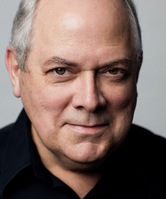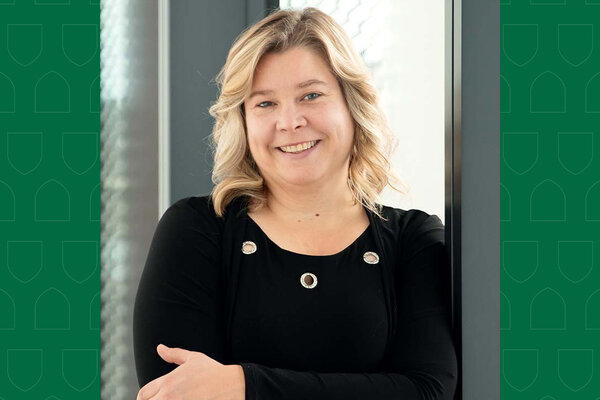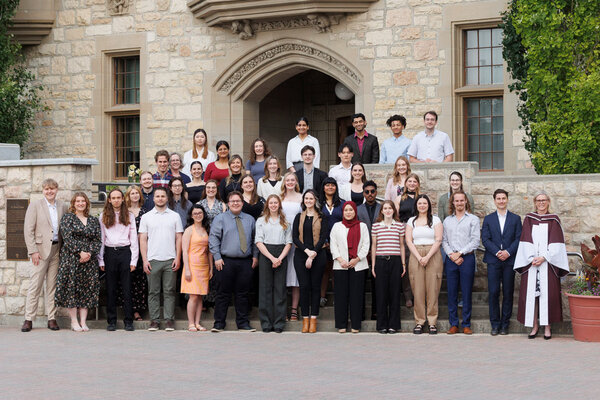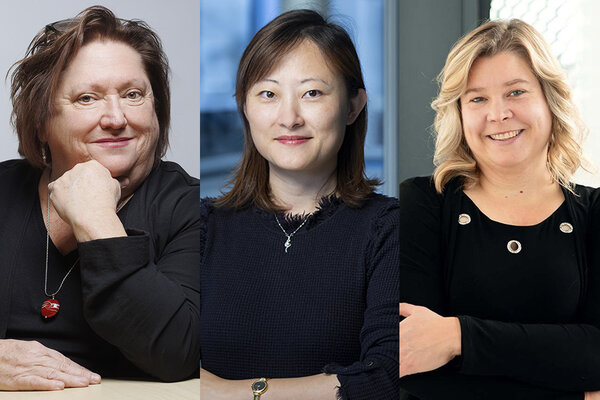
Thank you Dr. Garry Gable!
After 29 years of service of teaching, Dr. Garry Gable will be retiring July 1, 2023. We greatly thank Garry for his on-going work and successes in the Department of Music, university, and community. There will be a reception in Dr. Gable’s honour on Friday October 13, 2023, after the semester start-up concert, Play It Forward. Stay tuned!
Dr. Garry Gable has been with the University of Saskatchewan, Department of Music since 1994 in his capacity as Associate Professor (Voice). He is responsible for private vocal instruction and the providing of courses in vocal literature, vocal pedagogy, diction for singers, and is director of the Music Theatre Ensemble. The winner of the 2011 Provost's Teaching Award for the Division of the Humanities and Fine Arts, Dr Gable was strongly dedicated to providing the best possible vocal instruction to his students, with the goal of assuring that U of S students are competitive with students from any other undergraduate program. Dr Gable is sought out as a master teacher and clinician for the voice - and is recognized for his ability to get his students to sing naturally, no matter what the style of music. Students of singing at the U of S have gone on to the best graduate and other professional training programs in Canada and abroad, are regular winners in local and national competitions, and have gained success as performers in opera and other venues. In 2018, Garry, and his wife, collaborative pianist and vocal coach Kathleen Lohrenz Gable were invited to join the faculty of Bel Canto in Tuscany, an opera training and development program offered each summer in Greve-in-Chianti, Italy. Garry has performed widely in Canada and the United States and abroad. He is Adjunct Faculty with The Tianjin Conservatory of Music (Tianjin, China), the Wuhan Conservatory of Music, (Wuhan, China), and Minzu University in Lanzhou, China. He has performed with such groups as the Canadian Opera Company, Toledo Opera, the Charlottetown Festival, CBC Radio and TV, symphonies in Kitchener-Waterloo, Victoria, Windsor, Saskatoon, and Regina, Kelowna, and elsewhere. An active recitalist, Garry performs with his wife, Kathleen Lohrenz Gable. Their programs are always varied to include the breadth of classical music from Art and Folksong, to opera and oratorio, and Broadway. They have performed in Canada, the USA, Europe, and China. Garry possesses a rich bass-baritone singing voice capable of a wide range of styles, and in as many as 15 languages, from opera to Broadway and including a bit of jazz. Garry is also known for his versatile speaking instrument - and has ventured even into character voices and cartoon voices. On the stage, Garry is recognized for the strength of his characterizations from comic to dramatic roles. Dr Gable maintains regular associations with a variety of groups pertinent to his work, ranging from Actors Equity and Actra, The National Association of Teachers of Singing (NATS), the Canadian Registered Music Teachers Association, The Canadian Music Centre, and others. These affiliations help reinforce research areas that include Canadian Art Song, developing ongoing studies into improving communication between student and teacher in the pedagogical setting, developing better ways of creating and understanding pedagogical terms of reference for singers interested in 'cross-over' work, and establishing creative alliances that reach national and international borders. His commitment to music and song as a tool for cultural understanding and improved international relations has resulted in recital programs sung in multiple languages - beyond European traditions into areas of the far east, and Central and South America at the moment. The song is a mirror of a culture or society - by embracing the variety of languages he does, Dr Gable hopes that tolerance and comprehension for a different social group can be found by appreciating their music and culture. Further, songs (and music generally) are a means of proving our own identity as individuals in a complex and multi-layered society. Singers who are capable of reaching beyond the classical tradition to include popular, folk, modern, and theatrical idioms are better ambassadors for music, and are better interpreters of and for our broader culture. A full interview with Garry can be found below.
INTERVIEW WITH DR. GARRY GABLE
DoM: Can you tell us about your background and how you entered the music profession.
Garry: In my house, my older sisters studied piano, and I followed that tradition at about 6 years old until my teacher gave up her studio to teach school. There was no one else in our community after that so those couple of years had to last me through. I taught myself piano after that really. I had begun singing in church choir at 8 as a ‘boy alto’ and had to sing with the ‘older boys’ (10-12 years old) whose voices had begun to change. Neither of our parents played instruments, though mom sang in a sister act during WWII in Brantford, Ontario. Music was always in the house on the record player. Nelson Eddy and Mario Lanza were big favourites of my parents – but also Sinatra and Dean Martin, Ella, et al.
What really got me into singing was my 6th grade music teacher, Lois Pratt. She enrolled a bunch boys and girls in the local music festival when I was 11. I was put in a Boy soprano class – I can still sing that song – but was assessed by the old codger adjudicator as “should not be singing”. No definition of that, just those words, and hen-scratch adjudications that still cannot be deciphered. One thing led to another, and I wound up doing two Gilbert and Sullivan shows in grade 8 and 9. All nurtured by Mrs. Pratt. When I was in grade 9, my elementary school principal even negotiated a deal with the high school principal to allow me out of class at 2:30 each day for a month to go back to the elementary school to rehearse for the role of Captain Corcoran in their production of HMS Pinafore. I played that part with a cast on my arm – volleyball injury! And that got me formal lessons with a wonderful man close to our town who had studied in England.
After that, I was headed in other directions I thought. Dreams of being an architect waned with less than stellar math marks, and so I looked to Kinesiology. I was recruited to a university program developing the first ‘green-screen’ computer analytics – stickmen with dots. On my way to a final interview for that program I noticed the music building on my way across campus at the University of Windsor. I had a standing promise to my mom to see about continuing vocal training, if I could, so I went into inquire. I missed my interview in HK. I was dragged into an impromptu audition for music. I walked out of the building a music student. After the BMus in performance, I enrolled in the Opera Diploma (WLU) and during and after that I found myself performing in Broadway and opera productions in the Kitchener and Toronto area. My very first professional stint was at the Charlottetown Festival in 1981. I got there because their Artistic Director, Alan Lund, directed Community theater in Kitchener-Waterloo. I did two shows with him there and got invited to Charlottetown IF I learned to tap dance some simpler routines. I did that and so I worked three shows there that summer. That was my start.
In the late 1980’s Kathy was invited to teach at the University of Michigan and so we moved to Ann Arbor. I was able to get a bit of work in the US but was very limited. So, I enrolled for my MMus and then DMA at the University of Michigan. I was invited to teach Broadway to students at the University of Windsor’s BFA in Music Theater program offered in tandem with the Dept of Music there. That is how I got into teaching.
DoM: How has the vocal landscape changed since you arrived at the U of S 29 years ago?
Garry: I suppose the greatest change to the singing profession is still ongoing as ‘crossover’ stylings affect more and more trained singers. In my youth a singer was classically trained or not. No schools would consider letting a singer sing Broadway or jazz as part of their curriculum. There are still many yet who hold that view – but it is shifting pretty rapidly. Trained singing does not have to be operatic or classical in nature – it is about learning to sing without hurting yourself, while endeavouring to be artistic and generous with your spirit in whatever style of music. I’ve always maintained that and tried to encourage ‘crossover’ singing among those that wanted it as part of their singing life. There is little enough employment now for any singer, so an ability to sing in most genres is just more assurance that you can find work onstage rather than in the restaurant.
DoM: Can you speak of your professional highlights since you have been here at the U of S?
Garry: A tenured university job makes work in the profession of singing quite difficult in Canada and abroad. The need to be away from school for literally 3-4 weeks at a time made doing operas or musicals quite undoable generally (in the theater season – which is typically Sept -May/June). Recitals are occasional ‘add-ons’ for professional singers nowadays, there are few opportunities for them these days, but maybe they will make a comeback post-COVID? And singers must use agents in Canada to work onstage with most symphonies and opera and theater companies. Agents want you in Toronto or Montreal generally or able to get there at least overnight. As it is, I have been grateful for opportunities to work with the Saskatoon and Regina Symphonies and Saskatoon Opera Association productions over the years. And I had terrific experiences in productions with Persephone Theater too.
I can’t say enough about our experiences working in China on several occasions. To be honoured as an Adjunct Professor in three different universities in three different cities is humbling. To conceive of the density of population there is daunting – one city where we’ve been several times – Wuhan – has a population that is equal to all western Canada combined. The talent-level of the students is extremely high among faculty and students, so to be welcomed and respected there for our talents has been a true honour. More importantly for Kathy and I, we made such very good friends over there among faculty, and even a few students. I am so grateful for the efforts of Prof Li Zong (Sociology) who facilitated all our trips to China.
DoM: Can you speak of your teaching highlights since you have been here at the U of S?
Garry: Of course, I am proud of the teaching award I received, but I’ve rarely considered that kind of thing a goal for myself. The best record of my value is the success of my students. I think that is true for any dedicated teacher.
I don’t know if I could point to any one thing at U of S as a teaching highlight, but I will always reflect with great pride on the successes of my students in local, national, and international levels of competition, auditions for senior graduate schools, and work. Our students have always presented well in public, and in competitions, etc.
I see the Music Theatre Ensemble as a pillar for much of that success beyond the weekly lessons because the young singer was able to reinforce ideas of acting, character development, AND singing together, and we assured awareness in many periods and styles via that group. When our singers meet singers from other schools, they are often cited for their comfort onstage vs those at other schools who do not get that degree of development as an undergrad. I have had students who went on to place in big competitions or work professionally in opera or musical theatre. One former student was part of an ensemble cast that recently won a prestigious BAFTA award in London’s West End. I can’t take credit for the BAFTA of course, but I am proud to have had a hand in developing their skills as we did to make that success somehow more possible.
Music Theatre shows over the years have brought a great deal of joy to me. Every show was built around the students in the group. I don’t believe in doing ‘book-shows’ if you are forcing young singers to sing material that they aren’t ready to sing physically and easily. And few undergraduate singers can sing advanced operatic or even Broadway material as contained within a book-style show. Also – as a small school – we rarely had access to the range of voices/voice types a full show would require, and with only 4 hours a week to rehearse there was no room to have a group of twenty singers. We would have wound up with just song after song in ‘recital’ style rather than realised shows with a storyline or focus that each performer could advance themselves through, and that an audience could settle in to enjoy as more than watching their child or peer or a student perform. So, we built the shows specifically, drawing on material that allowed each student to be featured as a soloist, where they could learn to adapt to a character and speak lines of dialogue. Few opera programs do that, but it is starting to catch on in grad schools. I have always felt this approach best-advantaged the student, especially those going into school-teaching where they may find themselves needing to nurture teenagers through a role in the musical for e.g. With the variety of experiences and music genres we did, these people had more background to draw upon than if they just performed a solo – and they get lots of choral experience in the fine choirs we have.
DoM: You and Kathy have made quite the team matriculating vocal students and providing your own performances, can you elaborate on this?
Garry: I have always considered myself most fortunate to be able to have a ‘partner’ in music living in my house. Kathy’s expansive experience and skill brought another level or two to me first!! And then – working as a vocal coach, to each student she worked with. We were the envy of many a voice colleague who would give much to have a Kathy Gable available to partner with their students. It is definitely a plus for our school that she has been available to be there. We couldn’t have Literature classes here like the big schools, where a Kathy-type would lead a group of singers and pianists through song repertoire. Kathy’s skills with the singers has made it possible for me to focus on even more refining of the students’ skills both in language and interpretation, and across the variety of styles and genres a singer must traverse even as an undergrad. An undergrad singer must work in at least 5 languages including English and be able to manipulate the language as if a fluent speaker of it for nuance and interpretation. A vocal coach is a common requirement to facilitate that at all levels of singing nowadays.
For myself – working together is, in the end, a joy. Keeping family and work issues out of the rehearsing is sometimes a challenge, but we love to perform together. Taking our opportunities overseas, like in China, we have enjoyed meeting wonderful colleagues and student singers. Even occasionally giving Zoom-style lessons for some or working with a colleague on a specific music or pedagogical issue with a student performer using WeChat or Zoom, or Facetime.
DoM: You have directed many Musical Theatre productions since being here at the U of S, were there any in particular that stand out for you?
Garry: Two shows per year since 1994 – except for sabbatical years in 2006 and 2012 (only one) – so in the vicinity of 55 shows?! That kind of shocks me to think of it. We only repeated two shows in all that time. We did Amahl and the night visitors” twice (once as chorus, with soloists from TOTOS, and with the SSO) and once with student soloists and chorus. And I created a show of pre-WWI music focused on wartime experiences called “When the shadows end”. We did that twice as well.
We did only three ‘book-shows’ in all those years. In each case it was because we had the singers to do it, and in one I played one of the roles myself (Hansel and Gretel in 1997). I spoke already of Amahl, but we also did a perfectly good rendering of the Benjamin Britten arrangement of John Gay’s “The Beggar’s Opera” in 2014. That show was a collaboration with Drama supplying student designers for our sets, lighting, and costumes, and we invaded Greystone Singers and elsewhere to assemble a chorus of men. That was very difficult on 4 hours/week for rehearsal, but we did it to a very acceptable degree of success. We sacrificed a little of our time but ran rehearsals very closely to keep thing together and relied on a lot of people practicing alone because we could not call rehearsals outside of the class time, except for the Intensive Weekend, and the dress rehearsals. It was a good success.
I have suffered a few detractors for my approach to this ensemble, but I stand by it firmly and point to the many successes our students have enjoyed at least in part because they learned skills in music theatre well-beyond what they would get in a weekly lesson. Learning to act for a trained singer is often the last thing added to their resume, even after grad school. I have never supported that path. I became a better performer because I learned to act early in my development. I didn’t have to wedge it into my skills after everything was already built – I learned it alongside the need to sing well.
Through Music Theatre I’ve also been able to tap into part of myself that I didn’t know about either. I enjoy ‘creating’ these little shows, developing mini-stories attached to existing song material from a variety of composers and genres to create a single show that teaches the performer, and presents a theme or plot in a followable manner for an audience in the same fashion as a book-show does at higher levels of performing. I had to learn to develop an idea that took music beyond its original design to make a solo song into a group number, to cobble unrelated songs into a new story or concept or medley-style show, and then to write dialogue that unified them, creating new characters and stories. I had to learn to design on a shoestring budget our meagre sets and make less-than-ideal lighting work for our little projects. And I had to do it all mostly – the concept, arranging, design, staging, lighting (such as it was) and rarely did I sit in the hall during a performance as most directors would – I was in the booth running lights or out front running a video camera while a student ran lights.
And None of that would have been possible without the department’s support for the Music Director role. Having the skills of a Music Director made it possible for us to do the other, extra, but most important developmental polishing things. We wouldn’t have done even half what we did if we’d had to use student pianists who would also have to be taught how to play for singers, and understandably struggle with playing very difficult score reductions because they were still learning to play other very difficult music as a soloist for their own recitals. In the early years I even conducted, before the Music Director was created, and it was probably quite laughable watching me flail away trying to lead singers and a pianist. In those days we just turned on the lights and went. No fades, no specials, maybe flats or screens, and we had the ‘lovely’ multi-coloured curtain that used to adorn our stage. Oh – and the former stage – a set of band risers placed in in front of the original Quance stage. It was a giant drum for heavy feet. Thank goodness we were able to convince the university to fund the new stage and curtain.


